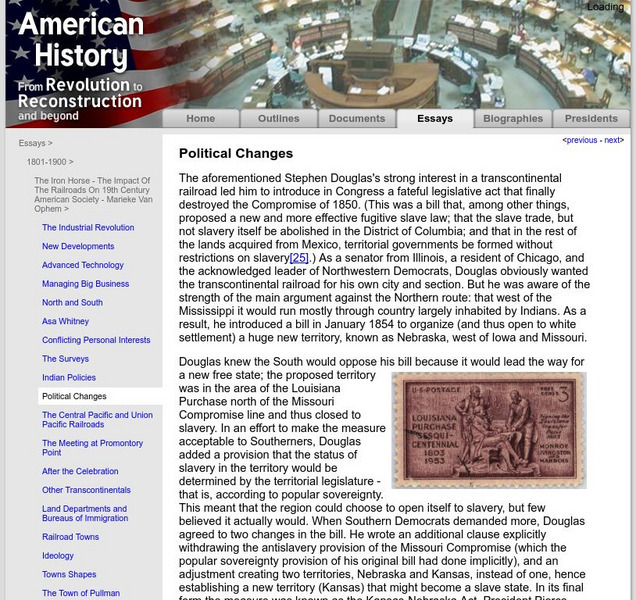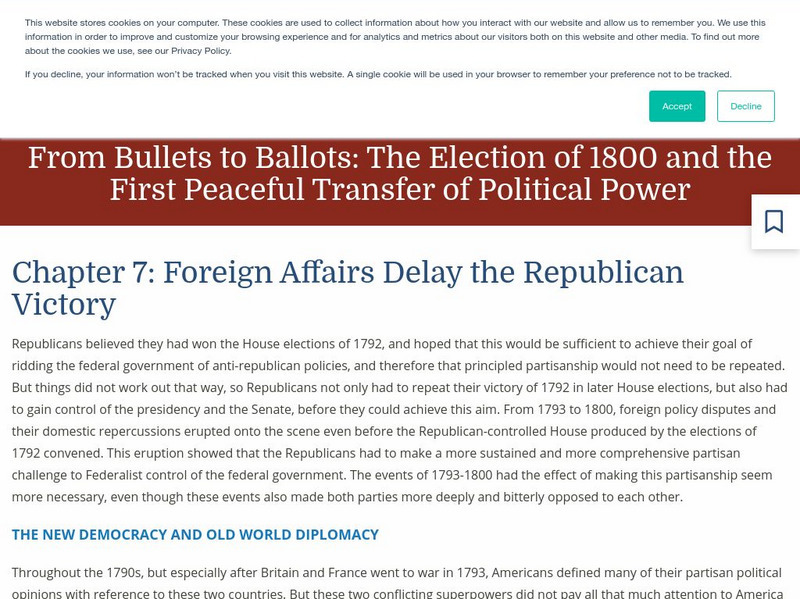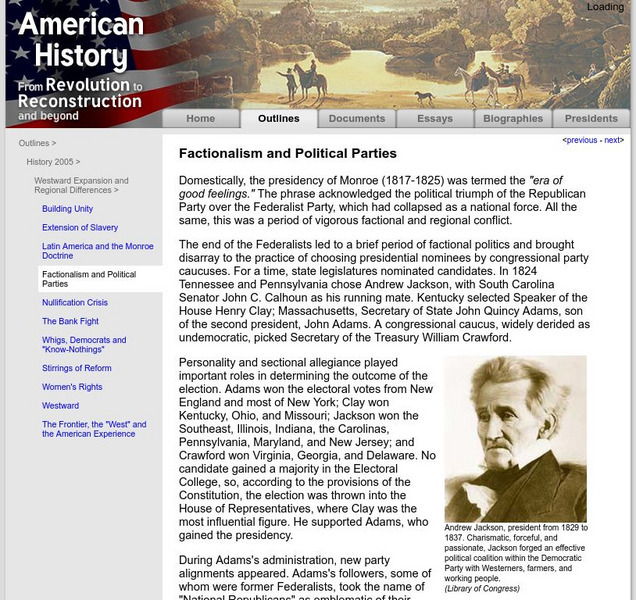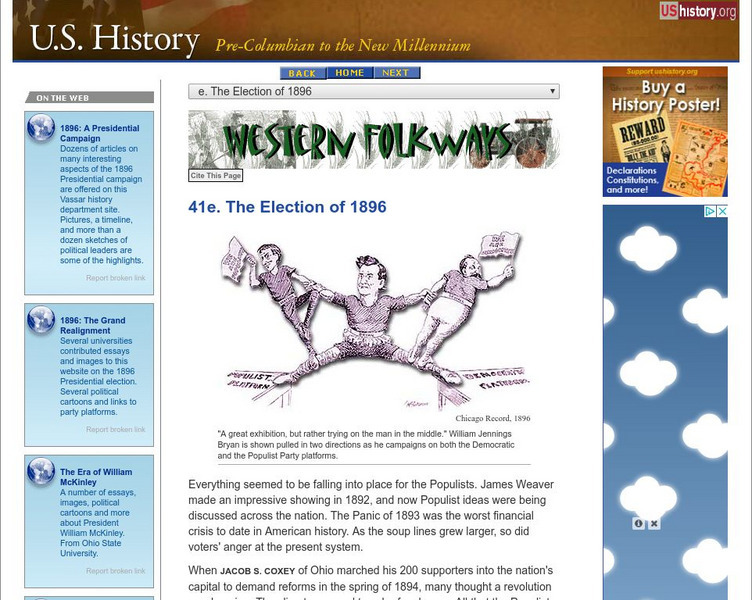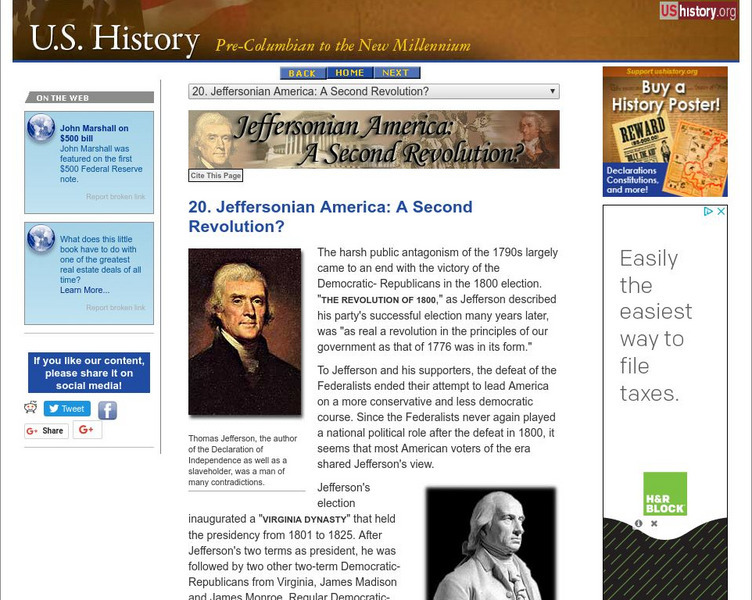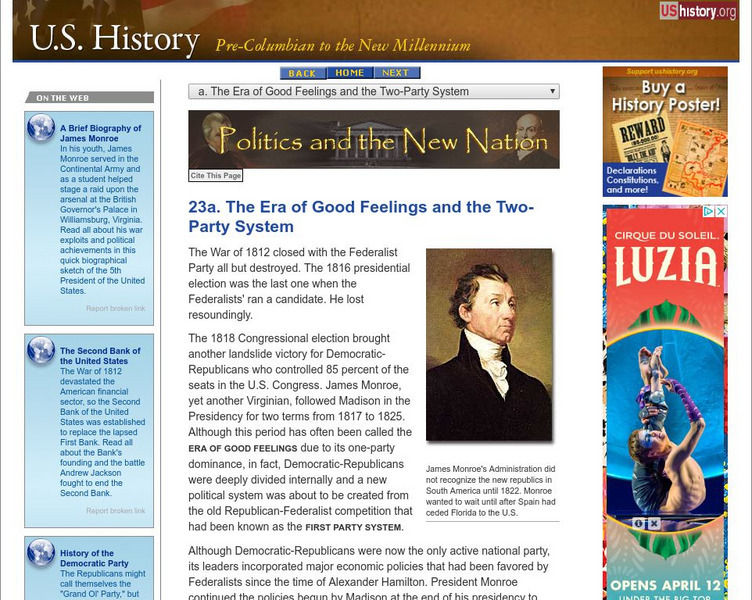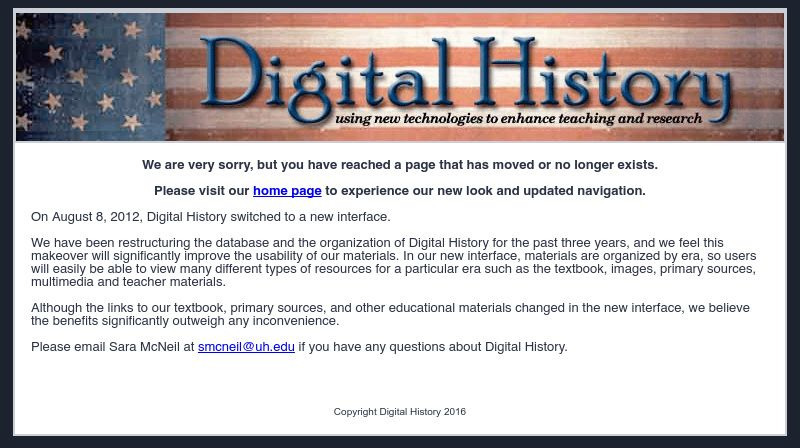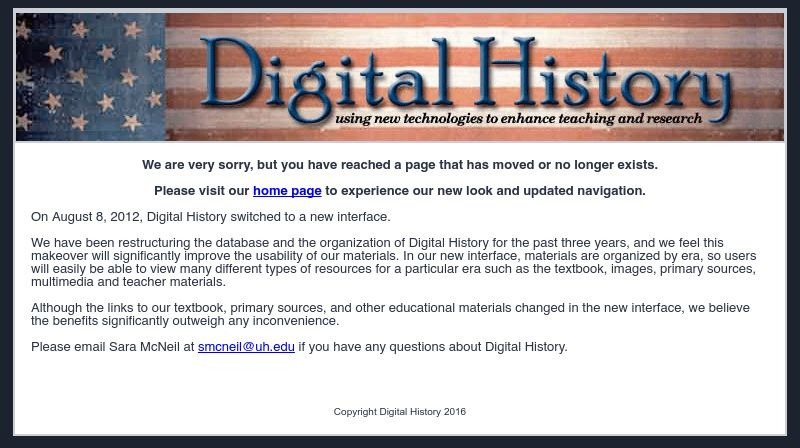University of Groningen
American History: Essays: The Iron Horse: Political Changes
From a lengthy essay on the history of the railroad in the United States. This section describes the dramatic political changes that took place with the passage of the Kansas-Nebraska Act in 1854. This led to the formation of the...
Digital History
Digital History: The Revival of the Slavery Issue
A brief account of how the Kansas-Nebraska Act split apart party coalitions and helped create the new Republican Party. See who joined this party and read about its goals.
Digital History
Digital History: The Election of 1856
A brief account of the election of 1856, the first in which the new Republican Party put forth a presidential candidate. See how the election split down regional lines.
PBS
Pbs News Hour: Lesson Plan: The Presidential Nominating System
This activity may be used to introduce students to the system of primaries and caucuses by which candidates for U.S. president are nominated by their parties. After completing this activity, students will understand the process by which...
PBS
Pbs News Hour: Lesson: The Presidential Nominating System
This lesson may be used to introduce young scholars to the system of primaries and caucuses by which candidates for U.S. president are nominated by their parties. After completing this lesson, students will understand the process by...
Teaching American History
Teaching American History: From Bullets to Ballots Chapter 7
The Republicans did not conquer their first election in the House in the 1792 election. Foreign affairs of the United States with both France and England hindered the success of the Republicans. This is explained in Chapter 7 from...
Digital History
Digital History: Margaret Chase Smith: The Conscience of the Senate
Margaret Chase Smith was the first woman elected to both houses of Congress. She was the first woman to enter the Senate without being appointed to the position. During World War II, she was the only civilian woman to go to sea in a Navy...
Teaching American History
Teaching American History: From Bullets to Ballots Chapter 4
Doubts and Disunity, Was the Downfall of the Federalists Inevitable? is Chapter 4 from Zvesper's book, From Bullets to Ballots. Understand what happened to the Federalists, the Democratic-Republicans, as being too similar to what they...
Other
A Brief History of the Two Party System
This site is a web-article on the brief history of the two party system.
US Department of State
Bureau of International Information Programs: History Outline: Sectionalism
Article reviews several conditions of American society that sowed the seeds of civil war, particularly slavery and sectional conflict.
University of Groningen
American History: Outlines: Factionalism and Political Parties
Find out about the rise of regionalism and factionalism in the development of political parties involved in the elections of 1824 and 1828.
Khan Academy
Khan Academy: Us History: 1800 1848: The Election of 1800
The growing partisanship between the Federalist camp, led by John Adams, and the Democratic-Republican camp, led by Thomas Jefferson, resulted in a bitterly contested presidential election in 1800.
University of Maryland
University of Maryland: Republican China (1915 1928)
The history of China during the time just before and just after World War I.
University of Groningen
American History: Essays: The American Whig Party (1834 1856)
This article presents the second part of the history of the Whig Party to find out why the issue of slavery brought about its demise.
Ohio History Central
Ohio History Central: Bull Moose Party
Find out about the spilt in the Republican Party during the campaign of 1912, which resulted in the formation of the Bull Moose Party, the progressive party which selected Theodore Roosevelt as its candidate.
Independence Hall Association
U.s. History: The Election of 1896
Read about the election of 1896 which had one candidate representing two political parties, and the other candidate who did not campaign. See what people supported the Democratic candidate and why. Find out who was elected and who...
Independence Hall Association
U.s. History: Jeffersonian America: A Second Revolution?
Read about the peaceful "revolution" that occurred in the election of 1800 when the party in power, the Federalists, was defeated in a democratic election by the Democratic-Republicans. See how this showed that the ideals of the new...
Independence Hall Association
U.s. History: The Era of Good Feelings and the Two Party System
The Era of Good Feelings lasted about a decade, spanning the administration of James Monroe. Read about the policies followed during his administration, and find out why, after the demise of the Federalist Party, there arose another...
Digital History
Digital History: The Election of 1800 [Pdf]
Perhaps the most important election in United States history, the election of 1800 pitted John Adams against Thomas Jefferson. Read about their differences and the differences in the political parties that supported them. [pdf]
Digital History
Digital History: The Birth of Political Parties
A brief look at the beginning of political parties in the new American nation. Find out the views of the two parties.
Digital History
Digital History: Civil War in Kansas [Pdf]
The Compromise of 1850 did not solve all the slavery issues in the territories, which was not surprising. Read about the Kansas-Nebraska Act, put forth by Sen. Stephan Douglas, who proposed that the issue be decided by popular...
Digital History
Digital History: Antislavery Timeline
A timeline of actions tied to the prohibition of or ending of slavery from the meeting of the Continental Congress in 1774 to John Brown's raid on Harper's Ferry in 1859.
Independence Hall Association
U.s. History: "Morning in America"
Read about the mood of the United States people in 1980, and see how Ronald Reagan's agenda reflected that mood.


